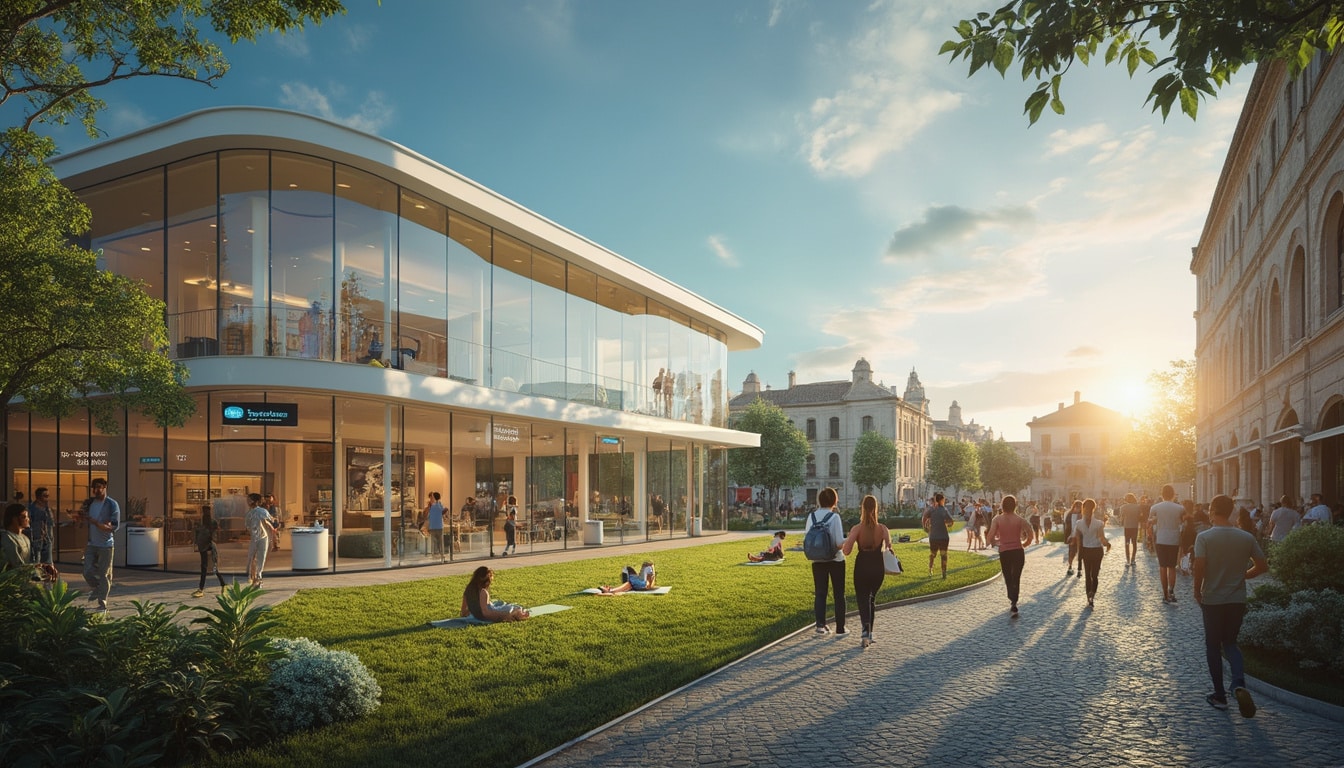« `html
Welcome to the wild world of biotechnology innovation!Where academia meets industry in a dance of discovery.And sustainable solutions take center stage.
In the bustling hub of TWB, the fusion of academic research and industrial needs isn’t just a partnership—it’s a powerhouse driving the future of industrial biotechnologies. Led by visionary Pascal Chapon, TWB thrives on the synergy between public institutions like INSA, INRAE, and CNRS, and forward-thinking companies eager to push the boundaries of what’s possible. This dynamic collaboration accelerates the transition to sustainable and competitive solutions across Europe, making TWB a key player in the innovation arena.
TWB operates as a pre-industrial demonstrator, bridging the gap between public research and industrial application. By acting as a catalyst, TWB enhances the collaboration between academia and industry, bringing disruptive innovations to life on a scale that meets industrial demands. Their efforts are supported by a network of French and European academic experts, strategic partnerships with industrial players, and the development of cutting-edge technological platforms like the Biotech Alley.
From global giants like L’Oréal and Michelin to nimble startups, TWB assists a diverse range of companies in solving their challenges through biotechnological advancements. For instance, TWB played a pivotal role in helping Carbios develop an innovative solution for plastic recycling and end-of-life management, culminating in the construction of their first industrial-scale plant. This success story highlights TWB’s commitment to fostering durability and circularity in industrial processes.
Beyond project support, TWB offers a comprehensive hosting program for researchers and startups, facilitating project realization and market growth. Currently, six startups thrive within TWB’s ecosystem, benefiting from expertise in areas like microbial process development and biocatalysis. TWB’s technological platforms and collaborative environment ensure these companies are well-equipped to navigate competitive markets with innovative technologies.
Addressing the common debate between ecological transition and economic profitability, TWB emphasizes that sustainability and competitiveness can go hand in hand. In the consumer goods sector, maintaining competitiveness is crucial, while in specialty sectors, higher margins allow for the adoption of biotechnological solutions without compromising growth. TWB integrates techno-economic analysis and life cycle assessment from the outset, ensuring that sustainability is woven into the fabric of every project.
Looking ahead, TWB is poised to expand its European footprint through its involvement in the IBISBA consortium in Toulouse. This collaboration with international laboratories across Spain, the Netherlands, Scandinavia, and Germany amplifies TWB’s reach and impact. While Europe remains the primary focus, TWB’s technological expertise also opens doors for global partnerships, as evidenced by the recent collaboration with Singapore’s Allozymes, marking TWB’s growing international recognition in the field of biotechnologies.
« `html
In the ever-evolving landscape of biotechnologies, innovation is the key to unlocking sustainable solutions that can transform industries and societies. TWB stands out as a pivotal player in this arena, leveraging a unique public-private partnership model to bridge the gap between academic research and industrial application. This approach not only accelerates the pace of innovation but also ensures that the solutions developed are both sustainable and competitive on a European scale.
Table of contents
TWB operates under the stewardship of three prestigious public institutions: the INSA, INRAE, and the CNRS. This collaboration forms a robust foundation that combines academic excellence with industrial expertise. According to Pascal Chapon, Executive Director of TWB, this synergy is crucial for accelerating the transition towards sustainable and competitive solutions in biotechnologies.
The public-private model adopted by TWB serves as a catalyst, enhancing the connection between public research and industrial needs. While industries are eager to collaborate with academia, the latter often lacks the necessary tools and resources to fully meet industrial demands. TWB fills this gap by introducing disruptive innovations that enable projects to scale up to industrial levels. This strategic approach is further reinforced by TWB’s partnerships with French and European academic experts, along with collaborations with industrial leaders, which are showcased through initiatives like Biotech Alley in Toulouse.
TWB plays an instrumental role in nurturing both startups and established companies within the biotech industry. By offering a comprehensive incubation program, TWB assists entrepreneurs and researchers in transforming innovative ideas into viable products and services. Currently, TWB hosts six startups, each at varying stages of maturity and targeting different market segments.
Companies like Carbios have benefited immensely from TWB’s support. TWB helped Carbios develop an innovative solution for recycling and managing the end-of-life phase of plastics, a project that originated from the vibrant ecosystem of Biotech Alley. This collaboration has led to Carbios building their first industrial-scale plant, demonstrating the tangible impact of TWB’s initiatives.
In addition to established companies, TWB provides startups with access to advanced biotechnological platforms and a conducive environment for cross-pollination of ideas. This holistic support system not only accelerates the growth of these companies but also fosters a culture of continuous innovation. More insights on collaborative innovation can be found in articles like Territorial Innovation Lab in Le Mans.
Balancing ecological transition with economic profitability is a common challenge in the biotech industry. TWB addresses this by integrating sustainability considerations from the outset of every project. In consumer goods, cost remains a critical factor, and companies adopting biotechnological solutions must maintain their competitiveness to thrive. TWB ensures that innovations not only reduce the environmental footprint but also remain economically viable.
In specialized sectors, where profit margins are higher, TWB’s biotechnological solutions can be more easily absorbed despite the associated costs. TWB conducts thorough techno-economic analyses and life cycle assessments to accompany innovations throughout their development phases. This holistic approach ensures that the solutions are both environmentally responsible and financially sustainable. For example, TWB’s collaboration with Groupe ISB highlights how sustainable practices can be seamlessly integrated into profitable business models.
TWB is not only focused on advancing biotechnologies within France but also has expansive ambitions across Europe and beyond. As part of the European consortium IBISBA based in Toulouse, TWB collaborates with various academic laboratories from countries like Spain, the Netherlands, the Nordic countries, and Germany. This network amplifies TWB’s ability to drive innovation through diverse collaborative efforts.
Despite strong competition from giants like China and the United States, TWB prioritizes Europe as its main target market. However, the consortium’s technological and scientific prowess opens doors to international opportunities. A testament to TWB’s global recognition is its partnership with Allozymes, a Singapore-based startup that sees TWB as a strategic ally for its European expansion. Such collaborations underscore TWB’s reputation as a leader in the biotech sector on the international stage.
The success of TWB’s public-private partnership model indeed offers a promising blueprint for future biotech innovations. By fostering close collaborations between academia and industry, TWB ensures that research is not only groundbreaking but also directly applicable to real-world challenges. This symbiotic relationship accelerates the development and deployment of sustainable biotechnological solutions.
Moreover, TWB’s emphasis on sustainability and economic viability sets a standard for future initiatives. By addressing both environmental and financial aspects, TWB demonstrates that it is possible to achieve significant ecological benefits without compromising profitability. This holistic approach is essential for the long-term success and acceptance of biotechnological innovations.
At the heart of TWB’s success is its ability to foster a culture of continuous innovation. By creating a collaborative environment where experts from various fields can exchange ideas and expertise, TWB ensures that innovation remains at the forefront of its operations. This approach is evident in initiatives like Football: A Fusion of Dynamism and Innovation and Coffee Embraces a Bold Wave of Innovation, where cross-disciplinary collaborations lead to unexpected and impactful solutions.
TWB’s investment in advanced technological platforms and strategic partnerships further reinforces this culture. By providing startups and established companies with the tools and support they need to experiment and innovate, TWB ensures that the biotech industry continually evolves and adapts to new challenges and opportunities. This relentless pursuit of innovation is what keeps TWB at the cutting edge of the biotech sector.
In the global biotech ecosystem, TWB serves as a critical hub for innovation and collaboration. By connecting European academic institutions with industrial partners and international startups, TWB facilitates the exchange of knowledge and resources across borders. This interconnectedness not only enhances the quality and impact of biotech innovations but also positions Europe as a leader in the global biotech arena.
TWB’s involvement in international projects and consortia, such as IBISBA, underscores its commitment to fostering a globally inclusive biotech community. The ability to attract and collaborate with international partners like Allozymes from Singapore highlights TWB’s influence and the trust placed in its capabilities worldwide. As the biotech industry continues to grow and evolve, TWB’s role as a facilitator of sustainable innovation will remain indispensable.
Scalability is a critical factor in the success of biotechnological innovations, and TWB has developed robust mechanisms to address this challenge. By serving as a pre-industrial demonstrator, TWB bridges the gap between laboratory research and large-scale industrial application. This ensures that innovations can be effectively scaled up to meet the demands of the market.
TWB’s extensive network of academic and industrial partners, coupled with its state-of-the-art technological platforms, provides the necessary infrastructure to support the scaling process. Whether it’s developing microbial processes using yeasts, bacteria, micro-algae, or amoebae, or advancing biocatalysis techniques, TWB ensures that each innovation is ready for industrial deployment. This meticulous attention to scalability not only enhances the feasibility of projects but also maximizes their potential impact on the biotech industry.
To stay updated on TWB’s latest initiatives and success stories, you can explore various resources and articles that highlight their work. For instance, the collaboration efforts and innovation-driven projects are detailed in publications like Coffee Embraces a Bold Wave of Innovation and Football: A Fusion of Dynamism and Innovation. These articles provide deeper insights into how TWB is transforming ideas into actionable, sustainable solutions within the biotech industry.
What makes TWB’s public-private model effective in driving biotech innovation?
How does TWB support startups and established companies in the biotech sector?
How does TWB balance ecological transition with economic profitability?
What are TWB’s ambitions at the European and international levels?
Can TWB’s model be a blueprint for future biotech innovations?
How does TWB foster a culture of continuous innovation?
What role does TWB play in the global biotech ecosystem?
How does TWB ensure the scalability of biotechnological innovations?
Where can you learn more about TWB’s innovative projects?
« `














